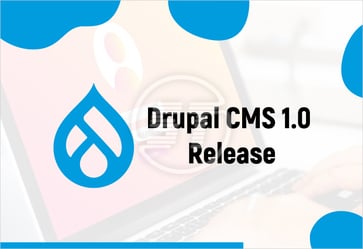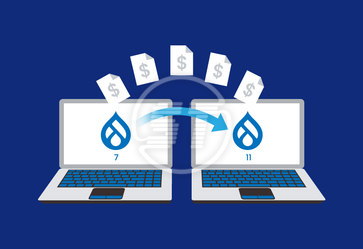Drupal is an open-source CMS that can be used for building simple websites to complex applications. Both individuals and organizations build platforms that engage users and deliver the best user experience. Drupal 9 is going to take over soon as the end-of-the-life period for older versions is just a few months from now. Drupal 8 is on the edge of transformation and it is going to deprecate gradually. However, due to the substantial differences from Drupal 7, many feel the transition to Drupal 8 as a necessity before migration to Drupal 9. So, there has been a sense of urgency and many have been looking forward to being part of the Drupal community and achieving smooth transformation.
In this article, we learn the guide, process, tricks, and techniques of Drupal 8 module development.
- Git and version system in Drupal Module - Git is where you kick-off your development. So, be sure about git and get trained if you are not sure about it. Brush up your git skills if you need to develop Drupal 8 modules. Understand the file structure, branches, and tags that help you in finding the correct module/theme for your website.
- Programming language -Drupal 8 is built on the Symfony framework and is based on PHP language, a web-centric scripting language, and many external libraries such as Symfony components. One needs to have a basic understanding of object-oriented programming (OOP). Get familiar with the existing Drupal core and modules. This simplifies things to great lengths in implementing changes without making any changes to the code.
- Databases and MySQL - Earlier, Drupal supported two databases - PostgreSQL and MySQL. Both Drupal 7 and Drupal 8 use PHP Data Objects library that is a powerful abstraction layer allowing developers to support multiple databases, including MySQL, PostgreSQL, SQLite, and MariaDB.
- Web Servers - While Drupal was originally written with Apache as the web server in mind. However, many other web servers like NGINX, Lighttpd can also run Drupal. You can choose the web server as per your comfort. But have a fair knowledge about whatever server you choose.
- Package Managers - Package managers are a blessing. If you are a Drupal developer, you can rely on package managers that are useful in the installation of external libraries and frameworks. For instance, a composer is one such package manager that can be installed for tools like Drush.
- Command-Line interfaces (CLIs) - You may have to administer some tasks repetitively and that may result in time and cost overruns. However, if you know how to manage CLIs, you can run these repetitive tasks easily. Drush is one of Drupal’s own CLI tool that makes the Drupal 8 module implementation easier and efficient. Focus on knowing Drupal’s CLIs such as Drush and Drupal console.
- Twig - Unlike its previous versions, Drupal 8 moved to the Symfony framework. Hence, Twig has become a necessity for the development of the new module. Having knowledge of the Twig template engine will give you an edge over others.
- Drupal Security - One of the strongest USPs of Drupal is its robust security. As a Drupal developer, you need a higher level of expertise to keep up with the new security updates as well as security threats. Gear up to the maintenance services that Drupal needs while keeping the website secure.
- Theme - Drupal theme is a vital aspect of the development process especially presentation aspects. You need to be aware of which theme to pick and which meets your needs. The right theme gets half the work done as it makes personalization simpler and easier. If you know how to customize the theme, you are good to go.
- Modules Bank - Drupal has abundant modules that assist you in simplifying various aspects. Having knowledge of Drupal modules helps in optimizing the process and enhancing the website in the best way possible. Get hands-on with the core and useful modules.
- Core Functionality - Drupal being an open-source framework, it is beneficial if one knows the core functions it. Drupal 8 has a positive shift as it embraced external libraries, frameworks, and communities. The core libraries have the functions and services facilitating the dB interaction, language translation, building forms, data encoding, and more. The core functionality of Drupal CMS is more important and you need to understand the flow.
- Contributed Drupal Modules - Any Drupal developer should have the knowledge of not just core modules but also contributed modules. Join the Drupal community, one of the most proactive forums for a great learning experience. It is a fantastic place to gain exposure to great knowledge from experts across the globe. Unlike core modules that are needed and cannot be disabled, contributed modules can be installed and uninstalled as per the need.
- Plugins - Plugins are the reusable code components that serve as new extensions for developers. You can add your own functionality and are critical for Drupal 8 developers. You can use Annotations for plugin discoverability. Annotations can be used only at the class level in Drupal 8. You can also use the YAML file for plugin discoverability.
- Style Guide - Once you are familiar with the themes and modules, the next important you need to pick up is the style guide. You need to understand the UI/UX design aspects for providing an excellent user experience. Build the style guide and pattern libraries with the color palette and basic typography.
- Configuration System - You need to understand the workflow to align the development process in a seamless fashion. The configuration system helps the team members to update and test the configuration locally first. It is recommended that your entire team understands the process.
- Core and Non-core aspects - Drupal has two folders - modules and themes. Understand where to place your modules and themes. You need to have core and non-core modules in separate folders without mixing them. The core modules need to be untouched.
- API site and coding practices - You can access online API documentation to understand every function in Drupal. Also comply with Drupal’s coding conventions like keeping code clean, consistent, and readable. With proper coding standards, you can keep it decluttered and reduce confusion.
- Debugging - Drupal developers need to be debugging pros as well. Knowing how to debug helps in reducing friction with the other teams and clients. Master the process of debugging as there are a ton of fixing requirements that may come your way during the process.
- Drupal Maintenance and Support - While your site is under maintenance mode or still under development, keep it hidden. Be cautious while logging out of the website so that you do not have to face any access issues in the future.
- Developer Settings - When you are developing locally, it is advised to disable caching, prevent CSS and JS file aggregation, and similar settings. Drupal 8 takes caching to a whole new level as many hooks get cached. Stay cautious as you may run the risk of overlooking certain aspects when disabled. So do toggle on/off the settings to ensure a production-like environment and see how it works.
And that’s a wrap from our end. You might also want to explore Drupal guides and be prepared while you dive into the Drupal universe. You can shoot your questions to us or get in touch with us to have an enriching experience.
Skynet Technologies will help If you want to boost your drupal website with drupal 8 modules that render exceptional functionalities. Our Drupal developers can customize Drupal’s features and functionality with Drupal Modules to address the key challenges of your business. Reach out to a presumed Drupal module development company having 21 years of experience and enough assets to build a website. Let's connect to get the perfect solution for business.


